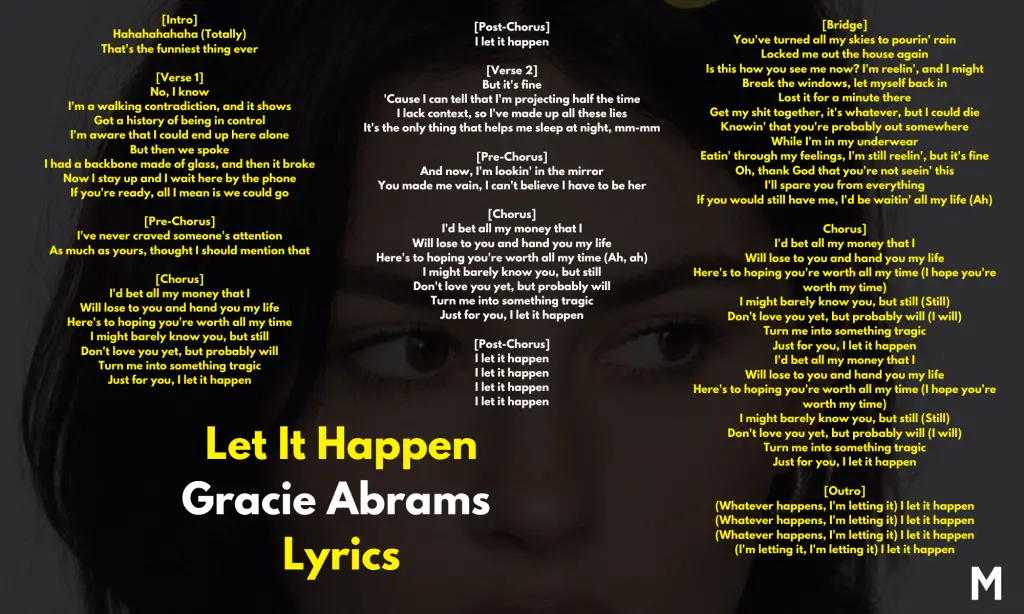Table of Contents
Image C/O Interscope
When I first heard Gracie Abrams’ “Let It Happen” during her opening set for Taylor Swift’s Eras Tour, I was struck by how it felt like an intimate confession, digging into themes of vulnerability, self-doubt, and the emotional gamble of love. Now that Abrams has stepped fully into the spotlight with her album The Secret of Us, songs like this one have become standout moments, showcasing her ability to capture the uncertainty of new relationships in a way that’s both deeply personal and universal.
As a writer and someone with a background in English literature, I couldn’t help but approach these lyrics with a more poetic lens. Using works from Christina Rossetti, Elizabeth Barrett Browning, and Philip Larkin, I’ll explore how Abrams’ lyrics reflect the tension between love’s risks and rewards.
These are just my own takeaways, but I hope to show how literary history—along with Abrams’ own modern perspective—offers a nuanced way to understand the song’s deeper meaning. Let’s see how this track fits into the larger, timeless story of love, longing, and letting go.
Gracie Abrams Let It Happen Lyrics
Gracie Abrams Let It Happen Meaning
“I’m a walking contradiction, and it shows”
Gracie Abrams opens the song with this bold admission, setting the tone for the rest of “I Let It Happen.” The narrator is torn between self-awareness and emotional surrender. Being a “walking contradiction” means they recognize their struggle to balance staying in control and giving into vulnerability. The line “Got a history of being in control” shows that they’re used to guarding their emotions, but this connection is making that impossible.
When they say, “a backbone made of glass, and then it broke,” it’s clear how fragile they feel. Glass seems strong at first, but it shatters easily. This image perfectly captures how love can expose even the strongest person’s weaknesses. The fact that the narrator allows this to happen shows their willingness to risk being hurt for the chance at love.
Christina Rossetti’s “Monna Innominata” speaks to this vulnerability. She writes:
“I loved you first: but afterwards your love / Outsoaring mine, sang such a loftier song.”
Rossetti’s speaker recognizes the imbalance in love, just like Abrams’ narrator does. They both show how opening yourself up can make you feel small and exposed, but it’s something you choose to do because the connection feels worth it.
“I can tell that I’m projecting half the time”
This line in the second verse adds a layer of self-awareness. The narrator knows they’re filling in the gaps of what they don’t know about the other person. They admit to “mak[ing] up all these lies” as a way to cope with their uncertainty. This is where the song really highlights the danger of idealizing someone. The narrator doesn’t truly know them, but they’ve built a fantasy around who they want them to be.
This reminds me of Elizabeth Barrett Browning’s “Sonnet 43.” In that poem, Browning says:
“I love thee with the breath, / Smiles, tears, of all my life.”
Browning’s love consumes her entirely, much like Abrams’ narrator has become consumed by their feelings. However, while Browning’s speaker finds fulfillment in that love, Abrams’ narrator shows us the risks. Projecting fantasies onto someone can lead to heartbreak if the reality doesn’t match the dream.
The vulnerability in this verse connects back to the opening line about being a “walking contradiction.” The narrator knows what they’re doing isn’t entirely healthy, but they can’t stop themselves. It’s a reminder of how human it is to want love so much that you’re willing to take that gamble.
“I’d bet all my money that I will lose to you and hand you my life”
The chorus captures the emotional high stakes of this relationship. The narrator uses a gambling metaphor—“bet all my money”—to show just how much they’re risking. Betting everything on someone else is a bold move, and the narrator knows they’re not in a winning position. The phrase “hand you my life” takes it even further, showing how deeply they’ve tied their sense of self to this connection.
When they sing, “Don’t love you yet, but probably will,” the uncertainty of the relationship is clear. They’re teetering on the edge of love, even though they know it might not be returned in the same way. The repeated refrain, “Turn me into something tragic,” suggests that the narrator expects this love to hurt them, but they’re still choosing to embrace it.
Elizabeth Barrett Browning’s “Sonnet 43” resonates here again. She writes:
“I love thee freely, as men strive for right; / I love thee purely, as they turn from praise.”
Browning portrays love as a choice, something you give freely even if it’s risky. Similarly, Abrams’ narrator chooses to give themselves over to this connection, knowing it could lead to heartache. Both works show that love is as much about surrender as it is about joy.
“And now, I’m lookin’ in the mirror / You made me vain, I can’t believe I have to be her”
In this line, the narrator reflects on how this relationship has changed them. The mirror symbolizes self-awareness, but what they see isn’t who they used to be. The phrase “You made me vain” shows how much this person’s opinion matters to them now. Their identity has become tied to how the other person sees them, and it’s clearly unsettling.
This ties in with Philip Larkin’s “Talking in Bed.” Larkin writes:
“It becomes still more difficult to find / Words at once true and kind, / Or not untrue and not unkind.”
Both the song and the poem explore how intimacy can reveal uncomfortable truths. For Abrams’ narrator, the mirror is a reminder of how vulnerable they’ve become, while Larkin’s speaker struggles with the distance that can exist even in closeness.
Abrams’ narrator feels vain and unsure, but they’re still holding onto the hope that this connection is worth it. This duality—the mix of hope and doubt—is a theme that runs through the entire song.
“You’ve turned all my skies to pourin’ rain”
The bridge of the song is full of emotional chaos. The line “Locked me out the house again” shows how rejected the narrator feels. They’ve given everything to this connection, and now they’re left outside, alone in the rain. It’s a stark image of isolation, which contrasts sharply with their earlier hopes.
Philip Larkin’s “Talking in Bed” captures a similar feeling. He writes:
“At this unique distance from isolation / It becomes still more difficult to find…”
In both works, there’s a tension between closeness and distance. Abrams’ narrator feels like they’ve been shut out emotionally, even though they’ve made themselves completely vulnerable. The rain imagery adds to the sense of despair and rejection, making this moment feel even more painful.
Despite this, the narrator doesn’t give up. Lines like “Lost it for a minute there” and “It’s whatever, but I could die” show their struggle to keep it together. Even in the worst moments, they’re still holding on to the possibility of being let back in.
“Whatever happens, I’m letting it”
The outro repeats the refrain, “I let it happen.” By this point, it’s clear that the narrator has accepted their vulnerability. They know they’ve lost control, and they’re okay with it. The phrase “Whatever happens, I’m letting it” signals a kind of peace. Even if this connection ends in heartbreak, the narrator doesn’t regret opening up.
Christina Rossetti’s “Monna Innominata” captures a similar sense of acceptance. She writes:
“Yet if you should forget me for a while / And afterwards remember, do not grieve.”
Both the poem and the song show that love is about taking risks, even when you know it might not last. The narrator in Abrams’ song embraces the uncertainty of love, choosing to focus on the experience rather than the outcome.
Themes, Meanings, and Main Takeaways
Gracie Abrams’ “Let It Happen” is a song that leans into vulnerability, love, and the uncertainty of giving yourself over to something bigger than you. The lyrics are deeply personal, like “I’d bet all my money that I / Will lose to you and hand you my life,” which captures the emotional gamble of falling for someone when you know it might hurt. This reminds me of Christina Rossetti’s “Monna Innominata,” where the speaker talks about the imbalance of love: “I loved you first: but afterwards your love / Outsoaring mine, sang such a loftier song.”
Both works highlight the emotional risks of loving someone deeply, even when you feel like they might not meet you in the same place. Abrams’ narrator seems fully aware of the potential heartbreak but lets it happen anyway, something Rossetti’s poetry has grappled with for over a century.
Abrams also explores identity and how love can change the way you see yourself. The line “And now, I’m lookin’ in the mirror / You made me vain, I can’t believe I have to be her” feels like a direct callout to how relationships force us to reflect on ourselves—sometimes in ways we don’t like. Elizabeth Barrett Browning tackles this idea in “Sonnet 43” when she writes: “I love thee freely, as men strive for right; / I love thee purely, as they turn from praise.” Browning shows how love can elevate and redefine us, but Abrams takes a more modern and conflicted view. For Abrams’ narrator, love forces her to see parts of herself that feel foreign or uncomfortable.
This mirrors the themes in Abrams’ album, The Secret of Us, which dives into the shifting emotions of relationships in your 20s, like in other tracks such as “Risk” and “Blowing Smoke.”
Finally, the isolation in “Let It Happen” is one of the song’s most haunting aspects. Lines like “Locked me out the house again” bring to life that feeling of being emotionally shut out. It’s a perfect modern echo of Philip Larkin’s “Talking in Bed,” where he writes: “At this unique distance from isolation / It becomes still more difficult to find.” Both Abrams and Larkin describe how love and closeness can also create emotional gaps, moments where connection feels impossibly far away.
This theme ties back to Abrams’ experience performing songs like this live during Taylor Swift’s Eras Tour, where her emotional vulnerability connects her to her audience in such a powerful way. Ultimately, “Let It Happen” reminds us that vulnerability is risky but necessary. Abrams’ ability to make these timeless struggles feel so personal and modern is exactly why her work resonates with so many people today.
The post Gracie Abrams Let It Happen Lyrics And Meaning: How Vulnerability Shapes Us appeared first on Magnetic Magazine.






